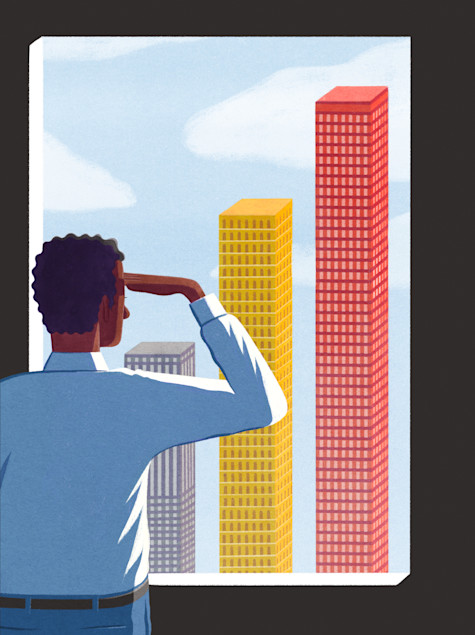The West and the Middle World: A Review of Destiny Disrupted, by Tamim Ansary

For quite a while, the U.S. was focused on other parts of the world. Wars in the Middle East, the Greek crisis, and North Korea all made headlines and were front of mind for many investors. Recently, though, that view has largely faded. We are still at war in Afghanistan, but no one seems to be talking about. A hard Brexit is looming, same thing. Attention has returned to what is happening here in the U.S.
This internal focus is the default state for the U.S. and usually makes sense. To understand when it does not make sense, however, it is important to have some baseline understanding of the world outside our borders. Today’s book—Tamim Ansary’s Destiny Disrupted—is a terrific tool to just that end. It tells the history of the world from the perspective of Islam. In other words, we get (almost) the same story we know but from a very different perspective. In many ways, the experience is unsettling but also very revealing.
What Is the History of the World?
As we learn it here in the West, the history of the world is the story of a charismatic prophet who founded a religion that shaped the world. That religion led to an empire that controlled most of the known world, that still provides the cultural foundations of today’s society, but that collapsed in ruins under the assault of barbarians, leading to a dark age. Here in the West, of course, that story is about Christianity and Rome.
In the Middle East, what Ansary calls the “Middle World,” we see the same story but with Muhammad and the Ottoman Empire. The story, on broad levels, is the same, providing a connection for the westerner to the Muslim experience, but the perspective is entirely different. The history of the West is about Rome and the aftermath, while the history of the East is about the Ottoman Empire and its aftermath. A big part of those histories, of course, is the intersection of the two. And this is where the perspective of one side can be almost unrecognizable from the other.
Intersection and Conflict
Showing that difference—and illustrating where it comes from—is where the book excels. Briefly, despite the superficial similarities, the West and the Middle Word are very different societies. Islam is more than a religion. It is a complete belief system that incorporates religion, politics, and law. There is no separation of church (mosque) and state, and that has given the Islamic world a very different cast not only in terms of politics but also in how a society can structure its economy. (This was one of the most interesting sections for me.) When you look at the intersection and conflict between the two societies, this difference is where it comes from.
From a western point of view, Islam can appear alien and irrational—but it isn’t. As a civilization of comparable size to that of the West, it follows its own rules and not ours. To understand not just those rules but also the events and constraints that led to them is to better understand why recent history has played out the way it has—and where it might go in the future.
The author grew up in Muslim Afghanistan and is now a writer here in the U.S. He has seen both sides and is well positioned to speak about the intersection, about misunderstandings about both and by both sides. That intersection is, of course, where the conflicts come—conflicts that although largely quiescent from a U.S. perspective at the moment will certainly be back. When they do return, it makes sense to have a better idea of where they come from.
Understanding the Modern World
Huntington’s idea of the clash of civilizations is a valuable but incomplete way to think about the modern world. Better is to acknowledge the clash and to go below the surface to find out where it comes from. This book is an excellent way to do that for the Islamic world. Since we invest in a world influenced by Islam, we should understand it. For me, this book is a great start. Recommended.
Editor’s Note: The original version of this article appeared on the Independent Market Observer.
The information on this website is intended for informational/educational purposes only and should not be construed as investment advice, a solicitation, or a recommendation to buy or sell any security or investment product. Please contact your financial professional for more information specific to your situation.
Certain sections of this commentary contain forward-looking statements that are based on our reasonable expectations, estimates, projections, and assumptions. Forward-looking statements are not guarantees of future performance and involve certain risks and uncertainties, which are difficult to predict. Past performance is not indicative of future results. Diversification does not assure a profit or protect against loss in declining markets.
The S&P 500 Index is a broad-based measurement of changes in stock market conditions based on the average performance of 500 widely held common stocks. All indices are unmanaged and investors cannot invest directly into an index.
The MSCI EAFE (Europe, Australasia, Far East) Index is a free float‐adjusted market capitalization index that is designed to measure the equity market performance of developed markets, excluding the U.S. and Canada. The MSCI EAFE Index consists of 21 developed market country indices.
Third-party links are provided to you as a courtesy. We make no representation as to the completeness or accuracy of information provided at these websites. Information on such sites, including third-party links contained within, should not be construed as an endorsement or adoption by Commonwealth of any kind. You should consult with a financial advisor regarding your specific situation.
Please review our Terms of Use.


